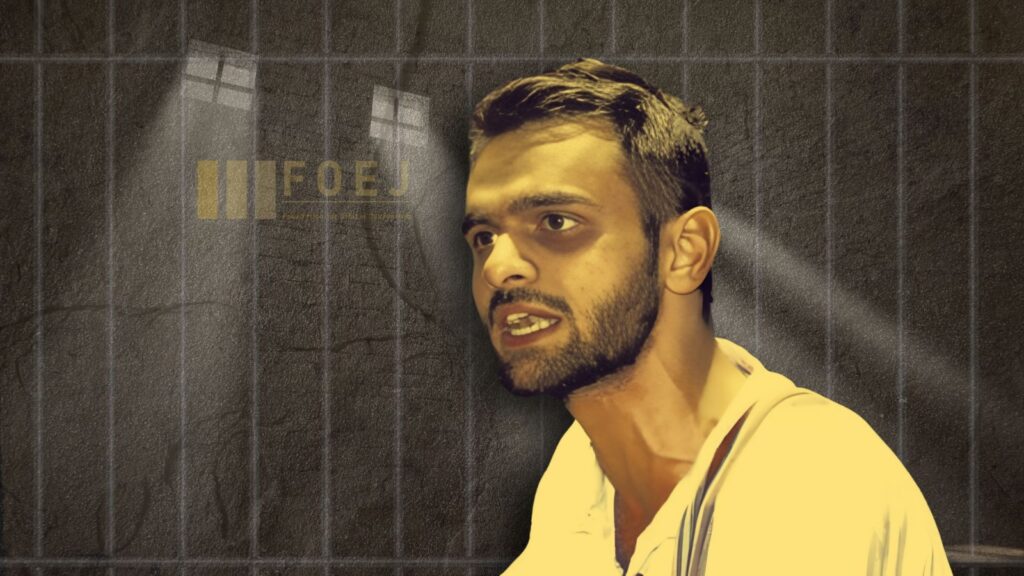September 13, 2024, marks four years since Umar Khalid, a prominent human rights activist, was jailed under the Unlawful Activities (Prevention) Act (UAPA) by the Hindu nationalist BJP government. Khalid, who was arrested on September 13, 2020, faces charges in a conspiracy case that places responsibility for the 2020 anti-Muslim violence in Delhi on Muslim activists and rights defenders.
The Curious Case of FIR 59/2020
Charges have been framed against him and 17 others under FIR No. 59/2020, including Sections 147 (punishment for rioting), 148 (rioting with deadly weapons), 149 (liability of every member of an unlawful assembly for offenses committed in furtherance of a common object), and 302 (punishment for murder) of the Indian Penal Code (IPC). They also face charges under Sections 13 (punishment for unlawful activities), 16 (punishment for terrorist acts), and 18 (punishment for conspiracy) of the Unlawful Activities (Prevention) Act (UAPA). Additionally, charges under the Arms Act, 1959, for the use of firearms during the riots have been filed. In 2021, the Delhi police added further charges under Sections 124A (sedition) and 153A (promoting enmity between groups based on religion, race, place of birth, residence, etc.) of the IPC.

In February 2024, Umar Khalid withdrew his bail plea application from the Supreme Court concerning the Delhi riots conspiracy case. The two-judge bench, led by Justice Bela M. Trivedi and including Justice Pankaj Muthal, permitted the withdrawal of the plea after noting Khalid’s submissions.
Senior advocate Kapil Sibal, representing Khalid, informed the Court that the petition was being withdrawn due to a “change in circumstances.” He indicated that Khalid would now pursue a fresh bail application before the trial court, stating, “We will try our luck in the trial court now.”
After approximately 15 adjournments and several months of proceedings in the Supreme Court, Khalid was unable to secure any relief.
Umar Khalid’s Lawyer on Sharjeel Imam
In May 2022, the case encountered further controversy when Umar Khalid’s lawyer, Trideep Pais, sought to distance Khalid from co-accused Sharjeel Imam. Pais argued that Khalid was being unfairly associated with the Imam, who had called for a highly communal protest. Pais further asserted that Imam had criticized the secular movement against the CAA, which Khalid had supported. He said, “There was absolutely no consensus between people who were opposed to CAA. They are divergent people with different schools of thought. Imam criticized a secular movement against CAA and I do not agree with it. I am being lumped with a person who calls for a deeply communal protest against CAA. There is no ideological meeting of minds,” Pais submitted for Khalid.
Khalid’s Journey
Umar Khalid, 34, a human rights activist and former Jawaharlal Nehru University (JNU) research scholar, has been an outspoken critic of the Indian government’s policies toward minorities. His political awakening began in 2008 after the Batla House encounter in Zakir Nagar, New Delhi, his home locality. The incident sparked widespread propaganda against local residents and students of Jamia Millia Islamia University, highlighting Khalid’s awareness of the injustices faced by minorities.
Following this, he joined JNU for his Master’s in MA at the Center for Historical Studies in 2009 and later completed his Ph.D. as well.
Khalid and JNU
Khalid was a significant member of the JNU activist community and had organized various events and led several protests on social and political issues. He initially joined the Democratic Student Union (DSU) but later resigned from it.

On February 9, 2016, students at Jawaharlal Nehru University (JNU) held a debate on the ethics of capital punishment, specifically addressing the hanging of Afzal Guru and Maqbool Bhatt. The event faced opposition from the rightwing Akhil Bharatiya Vidyarthi Parishad (ABVP), which, along with some media outlets, alleged that participants had chanted “anti-national” slogans. Subsequently, the Delhi Police filed sedition and criminal conspiracy charges against the event organizers. Umar Khalid surrendered to the police on February 24 and was held in Tihar Jail until the Delhi High Court granted him interim bail on March 28, 2016. Later investigations revealed that the slogans were not chanted by university students, and news channels had broadcast doctored videos, fueling the controversy against JNU students.
Despite the clarification, the JNU administration continued to impose fines and sanctions on Umar Khalid, who faced legal battles to remain on campus and submit his Ph.D. thesis in 2018. Facing death threats and accusations of being a Jaish-e-Mohammad sympathizer and Pakistani agent, Khalid persisted in advocating for marginalized and oppressed groups. His activism included raising issues about Najeeb’s disappearance, Rohit Vemula’s suicide, and the Bhima Koregaon protests. After his release from jail in 2016, Khalid, alongside Anirban Bhattacharya, established the Bhagat Singh Ambedkar Students Organization (BASO) to advance leftist and Ambedkarite politics, broadening their focus beyond gender issues addressed by the Democratic Students Union (DSU).
United Against Hate
“Hatred has become very organized in India; therefore, its response needs to be organized as well.”
Khalid with a few other activists launched a campaign named United Against Hate (UAH) in July 2017. The campaign was launched in response to the lynching of Muslim youth and cow vigilantism.
Booked in a FIR charged with promoting Enmity.
“Khauf se Azaadi: Freedom Without Fear”
In January 2018, Umar Khalid delivered a speech alongside Jignesh Mewani at the Elgaar Parishad rally in Pune, commemorating the 200th anniversary of the Battle of Koregaon. The speeches emphasized Dalit-Left unity and condemned Hindutva violence. Following the event, Khalid was named in an FIR (First Information Report) on charges of promoting group enmity and inciting offenses against the state. Later that year, in August, during a United Against Hate event titled “Khauf se Azaadi: Freedom Without Fear” at the Constitution Club, a man attempted to shoot Khalid. This attack came after Khalid had repeatedly requested protection from the Delhi Police due to numerous death threats.
As Umar Khalid completes four years of incarceration, his case remains a symbol of the broader struggle over civil liberties and political dissent in India. Khalid, a vocal critic of discriminatory laws and an advocate for marginalized communities, has faced severe legal challenges under the Unlawful Activities (Prevention) Act (UAPA), with charges that many advocate as politically motivated.









